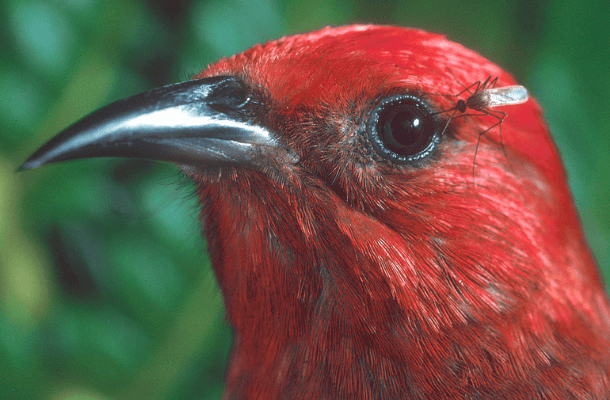When it comes to saving Hawai‘i’s native birds, it takes a network of committed partners and innovative strategies. Both are key as we work to address the concern of mosquitoes to these endemic bird species.

'Apapane with mosquito on eye. Photo by Jack Jeffrey
Without bold and immediate action, up to 12 species of endemic Hawaiian honeycreepers will go extinct in the near future. The culprit will be deadly introduced diseases, such as avian malaria and pox. These pathogens are transmitted via nonnative mosquitoes, which, as the climate warms, are moving upslope into the birds' last forest strongholds. Just one bite from an infected mosquito is enough to kill the iconic ‘I‘iwi.
To combat this problem, ABC and partners are planning to use a naturally occurring bacteria as “birth-control” to reduce mosquito numbers in high-altitude forest bird habitat across the islands. The partnership is actively engaging community members to highlight the importance of this work for conserving Hawai‘i's native birds. Engagement with stakeholders in Hawai‘i is also ongoing to incorporate public feedback into the planning process.
As part of the multi-agency partnership, ABC is helping to coordinate the design and implementation of a strategy that will disrupt the mosquitoes' breeding cycle and cause their populations to crash. Under the plan, a secure lab would rear mosquitoes containing a strain of Wolbachia bacteria that makes them unable to successfully reproduce with wild females in Hawai‘i. Only male mosquitoes, which don't bite birds or people, and therefore don't transmit the diseases, would be released. When wild female mosquitoes mate with the released males, they will lay eggs that don't hatch.
Scaling up this proven technique is a key component of ABC and its partners' strategy to save Hawai‘i's forest birds from extinction. Done across a landscape scale, this method could dramatically reduce mosquito populations.
Wolbachia is found in over 60 percent of arthropod species, and poses no risk to humans. In fact, this safe, proven method is being used to stop the mosquito-borne transmission of human diseases such as dengue, Zika, chikungunya, and others.
Over the next three years, ABC and project partners will collect data on mosquito abundance and distribution to construct a successful implementation strategy, while also developing and testing the “birth-control” efficacy of the Wolbachia mosquitoes. These results will help inform the regulatory process, which includes securing required state and federal permits for the project.
Chris Farmer, ABC's Hawai'i Program Director, answers some questions about this project in the 2020 winter issue of Bird Conservation.
To learn more about this project, please visit the official Birds, Not Mosquitoes website: https://www.
To make a donation to support this effort, click here!